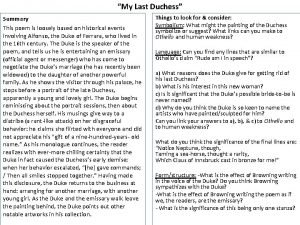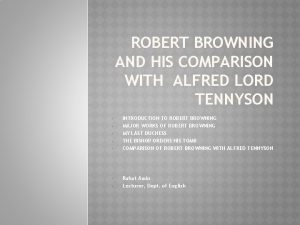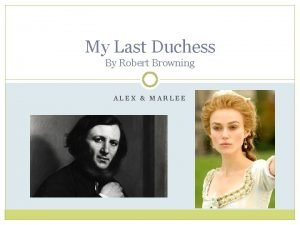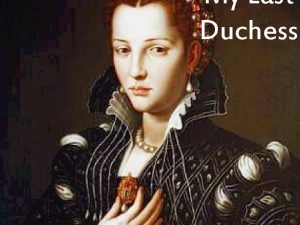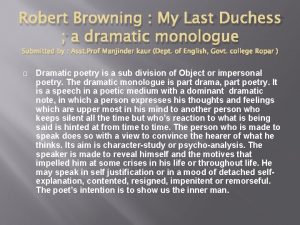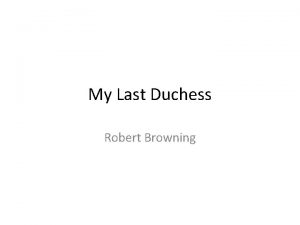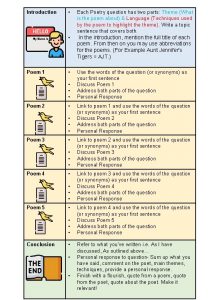My Last Duchess Summary This poem is loosely




- Slides: 4

“My Last Duchess” Summary This poem is loosely based on historical events involving Alfonso, the Duke of Ferrara, who lived in the 16 th century. The Duke is the speaker of the poem, and tells us he is entertaining an emissary (official agent or messenger) who has come to negotiate the Duke’s marriage (he has recently been widowed) to the daughter of another powerful family. As he shows the visitor through his palace, he stops before a portrait of the late Duchess, apparently a young and lovely girl. The Duke begins reminiscing about the portrait sessions, then about the Duchess herself. His musings give way to a diatribe (a rant-like attack) on her disgraceful behavior: he claims she flirted with everyone and did not appreciate his “gift of a nine-hundred-years- old name. ” As his monologue continues, the reader realizes with ever-more chilling certainty that the Duke in fact caused the Duchess’s early demise: when her behavior escalated, “[he] gave commands; / Then all smiles stopped together. ” Having made this disclosure, the Duke returns to the business at hand: arranging for another marriage, with another young girl. As the Duke and the emissary walk leave the painting behind, the Duke points out other notable artworks in his collection. Things to look for & consider: Symbolism: What might the painting of the Duchess symbolize or suggest? What links can you make to Othello and human weakness? Language: Can you find any lines that are similar to Othello’s claim “Rude am I in speech”? a) What reasons does the Duke give for getting rid of his last Duchess? b) What is his interest in this new woman? c) Is it significant that the Duke’s possible bride-to-be is never named? d) Why do you think the Duke is so keen to name the artists who have painted/sculpted for him? Can you link your answers to a), b), & c) to Othello and to human weakness? What do you think the significance of the final lines are: “Notice Neptune, though, Taming a sea-horse, thought a rarity, Which Claus of Innsbruck cast in bronze for me!” Form/structure: -What is the effect of Browning writing in the voice of the Duke? Do you think Browning sympathizes with the Duke? -What is the effect of Browning writing the poem as if we, the readers, are the emissary? - What is the significance of this being only one stanza?

“The Laboratory: Ancien Regime” Summary This poem is loosely based on historical events involving events at the palace of Louis XIV of France (known also as the Sun King). The subtitle “Ancien Regime” places the events before the Revolution of 1789. The usual order of things was disrupted in the 1670 s by a spate of poisonings, probably carried out by Marrie-Madeleine de Brinvilliers and her lover Sainte Croix died mixing a deadly potion, when his mask slipped from his face. The poem is narrated by a young woman to an apothecary, who is preparing her a poison with which to kill her rivals at a nearby royal court. She pushes him to complete the potion while she laments how her beloved is not only being unfaithful, but that he is fully aware that she knows of it. While her betrayers think she must be somewhere in grief, she is proud to be instead plotting their murder. She notes the ingredients he uses, paying particular attention to their texture and color. She hopes the poison will "taste sweetly" so she can poison the two ladies she has in her sights; she will have the last laugh by having them killed in a painful way that will also torment her beloved. When the poison is complete, she promises the apothecary both her fortune (her "jewels" and "gold") but also lets him kiss her. Finally, she is ready to go dancing at the king's and end her torment. Things to look for & consider: Symbolism: The laboratory seems to be a secret, almost “underground” place. If so, what might the significance of this? How might this location, or the idea of secrets, be linked to Othello and human weakness? - What might be the broader significance of the idea that the order of things at the King’s palace might be disrupted? Language: Can you find any religious language? What might be it’s significance? What evidence is there that pride/jealousy motivate the speaker more than money (look at stanza XII especially). How does this differ to characters in Othello and how might it be linked to human weakness? Some characters in Othello seem unable to take responsibility for their actions. Does the language of the speaker suggest that she is ashamed or regretful? Look especially at stanzas VI, X, XI. Form/structure: What is the effect of Browning writing the poem as if we, the readers, are the apothecary (chemist)? The rhythm of the poem is, mostly, in dactyls (this three beats, the first strong or stressed, the second and third weak or unstressed). This gives the poem a dance-like feel – is this significant in any way (look at the last lines of stanzas III and XII).

“The Patriot: An Old Story” Summary This poem is told by a rebel soldier on his way to be executed. As he walks down the road, people jeer, mock, and shout at him, hurtling stones and other things at him. He is treated as a traitor, a criminal. But as he walks, the speaker remembers that, one year ago to the day, he walked the same street, and the same people who now scorn him celebrated him for a soldier and a hero. In this poem, place or setting acts as the backdrop of painful memories. The speaker quite literally has to walk down memory lane, to his death. The historical backdrop to this poem is the Risorgimento (or Uprising), a series of battles fought during the nineteenth century by revel fighters, who hoped for a unified Italy was still made up of city states, which were controlled by foreign powers (particularly Austria). The Risorgimento was ultimately unsuccessful. Both Browning and his wife, the poet Elizabeth Barrett Browning, were in favour of a unified, independent Italy. Things to look for & consider: Symbolism: What is a patriot? How does the speaker’s fall from grace tie in with Othello, tragedy, and human weakness? -What might be the symbolism of the roses n the first stanza be? - What might the symbolism of the flaming church spires in stanza I be? Language: “Alack, it was I who leaped at the sun / To give it my loving friends to keep” (stanza III): In Greek mythology, who flew too close to (“leaped at”) the sun, despite many warnings? How does this link to tragedy, human weakness, and Othello (which other mythical figure is mentioned in Othello? )? (Notice that the speaker seems to recognise his mistake. But is this genuine, or ironic? ) “Shambles Gate” (stanza IV) refers to a butchers’ market, where animals are slaughtered and sold. What is the significance of this metaphor? (Can you make links to weakness &/or Othello? ) Look at the final stanza: how does the speaker feel about death? Does this final stanza, and the poem as a whole, present the speaker as weak or strong? How is the crowd presented? Form/structure: The rhyme scheme and rhythm make this poem an example of Sicilian Quinatain (5 -line verse, following a particular rhyme scheme). Why might this be significant (the clue’s in the name)?

“Porphyria’s Lover” Summary “Porphyria’s Lover, ” which first appeared in 1836, is one of the earliest and most shocking of Browning’s dramatic monologues. The speaker lives in a cottage in the countryside. His lover, a blooming young woman named Porphyria, comes in out of a storm and proceeds to make a fire and bring cheer to the cottage. She embraces the speaker, offering him her bare shoulder. He tells us that he does not speak to her. Instead, he says, she begins to tell him how she has momentarily overcome societal strictures to be with him. He realizes that she “worship[s]” him at this instant. Realizing that she will eventually give in to society’s pressures, and wanting to preserve the moment, he wraps her hair around her neck and strangles her. He then toys with her corpse, opening the eyes and propping the body up against his side. He sits with her body this way the entire night, the speaker remarking that God has not yet moved to punish him. Things to look for & consider: Symbolism: - What might the storm symbolize? What technique is being used here? - Can you find other examples of pathetic fallacy of weather symbolism (look at Porphyria’s entrance)? -If Porphyria is not a “real” woman, what might she represent or symbolize? -Can you link either of your answers to Othello and human weakness? Language: How does the speaker imagine Porhyria viewed him? How is Porphyria presented in this poem? Are there any similarities to be made between her and Desdemona? What links can you make between this and Othello and human weakness? How is Porphyria presented in death? What is the significance of this, and how might it be linked to Othello and human weakness? What reasons are there for the speaker killing Porphyria? Is her death an act of aggression, or of sacrifice? Again – links to human weakness and Othello? Form/structure: What might the effect of this being presented in one stanza? Does the rhyme scheme have an effect on the reader?
